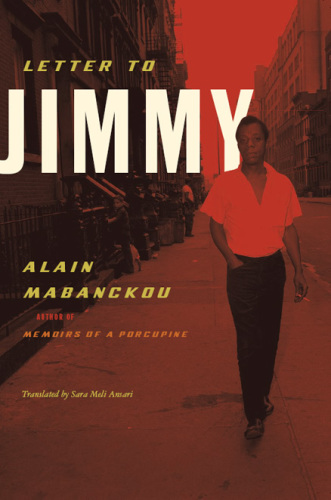
Letter to Jimmy
- اطلاعات
- نقد و بررسی
- دیدگاه کاربران
نقد و بررسی

November 24, 2014
Originally written on the 20th anniversary of James Baldwin's death in 1987, this book by Mabanckou (Memoirs of a Porcupine) addresses Baldwin in the second person. Much of the first half recounts Baldwin's biographic details, illuminating the preâCivil Rights Movement Harlem in which Baldwin was raised or the sense of artistic and personal liberation he would find in France. Precisely because of the use of the second person, the format of the prose can feel a bit stilted; Mabanckou is ostensibly telling Baldwin about his own life: "During your childhood, you have countless opportunities to witness the extent to which your father distrusts the white man, whoever he may beâ¦." Once the rhythm of the text becomes more established, however, Mabanckou displays more clarity on the cultural and political context that Baldwin both represented and contrasted. Eventually, as Mabanckou explores correlations between Baldwin's ideas and the contemporary world, the book really comes into its own. For instance, Mabanckou questions whether some of the "Rwandan genocide" literature echoes Uncle Tom's Cabin: "If we are not careful, an African author will be able to do nothing but await the next disasterâ¦." One of the most influential and fearless writers of the 20th century, Baldwin deserves this celebration of his life, so that readers may encounter, in a new light, the fortitude of this true revolutionary.

October 15, 2014
A celebration of James Baldwin's literature and legacy published in commemoration of the 20th anniversary of his death.Written as an open letter to the late author and initially published in France in 2007, this book has been classified by the publisher as "literary memoir," but it functions more as an elliptical biography. Like his literary idol, Mabanckou (French Literature/UCLA; Broken Glass, 2010, etc.) is an emigre to Paris and has spent plenty of time in the United States. But since he is an African, he brings a different perspective to themes of literary exile, race relations and the African diaspora than have Baldwin's biographers (whom he cites liberally). He's particularly incisive on the relationship between Baldwin and the stepfather who was much older than his mother, as Baldwin wrestled with issues of identity from childhood. His stepfather hated "white demons" and their culture with a virulence that the boy didn't share and also instilled a harsh religiosity that his stepson would also reject. Yet James was himself "preaching from the age of fourteen," and it was there that he became "aware of the power of the word," with the biblical resonance that would inform so much of Baldwin's work. Moving to France and openly acknowledging his homosexuality reinforced Baldwin's sense of otherness, and he rebelled against such literary patriarchs as Richard Wright. "[I]dols are created in order to be destroyed," he wrote of his rift with Wright. He also found himself at odds with the Black Power militants of the 1960s, with Eldridge Cleaver condemning him for "the most agonizing, complete hatred for Blacks." Yet the novelist's influence endures, and his imprint is even stronger in France, writes Mabanckou, who declares, "[i]f you return to this world, Jimmy, you will judge your homeland even more severely than you did when you were alive." The conceit of the letter and the oddly intimate tone toward "Jimmy" make this a curious work, but it's often insightful and illuminating.
COPYRIGHT(2014) Kirkus Reviews, ALL RIGHTS RESERVED.

November 15, 2014
This curious book by the Congolese-French writer Mabanckou (French and Francophone studies, Univ. of California Los Angeles; Broken Glass) is written in the form of a second-person epistle to the revered African American writer James Baldwin (1924-87). Mabanckou tells Baldwin's life story; this experiment in biography is partially successful because it rarely draws attention to its own self-reflexivity. The details of Baldwin's life are unevenly presented (Mabanckou barely mentions any of his subject's accomplishments from 1966 to 1985), focusing predominantly on his upbringing and years of apprenticeship as a writer. The book heavily looks to accounts of Baldwin by David Leeming and James Campbell. There are sections devoted to Baldwin's tumultuous relationship with Richard Wright, his homosexuality, his time in France, and his attitudes about black anti-Semitism, but offers little in the way of literary analysis. Distinguishing this volume from others about Baldwin, however, is Mabanckou's observations about the vital and prescient international scope of Baldwin's oeuvre. VERDICT This pleasant, quick read introduces readers to some of the central concerns of Baldwin's work, but scholars or devotees of the writer will find little new information about him here.--Brian Flota, James Madison Univ., Harrisonburg, VA
Copyright 2014 Library Journal, LLC Used with permission.

October 15, 2014
This short book is a touching and personal tribute to James Baldwin by Congolese- (Brazzaville-) born writer Mabanckou (Memoirs of a Porcupine, 2012). Although well grounded in the work of the prolific and iconic Baldwin, Mabanckou, unlike some critics, biographers, and readers, appears to have been affected less by Baldwin's otherwise influential essays than by his fiction (especially Go Tell It on the Mountain and Giovanni's Room), though he does acknowledge the importance of Baldwin's classic essay, Everybody's Protest Novel, about the author's relationship with Richard Wright, and The Fire Next Time, which earned Baldwin a Time cover story. Part of this book's charmand perhaps also its weaknessis that it is, finally, an outsider's book. The text is slightly off-key in its detail about mid- to late-twentieth-century America and about Baldwin's native New York City. But who could better understand the iconoclastic, gay, often angry (if ambivalently so) expatriate Jimmy Baldwin than another author outside the mainstream? Mabanckou has written an odd, emotional, and quite beautiful homage to a writer who remains a major African American voice almost 27years after his death.(Reprinted with permission of Booklist, copyright 2014, American Library Association.)




دیدگاه کاربران